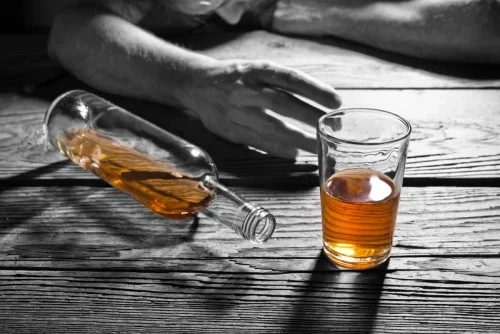Red wine and resveratrol: Good for your heart?

Studies have found that it may either decrease or increase blood pressure, so more research is needed to help clarify the relationship. Evening primrose (Oenothera biennis) oil may reduce blood clotting. However, more research is necessary to see if ginkgo affects blood clotting in the human body. Although moderate amounts of red wine may be beneficial for your cardiovascular health overall, there are some potential disadvantages of red wine to watch out for. The distinction of red vs. white is based on the color and composition of the clots, but all clots contain varying amounts of platelets, fibrin, and red blood cells. Activated platelets attract other platelets, and they stick to each other to plug up the wound and stop the bleeding.

Disadvantages of Red Wine
- Heads up that some of these “don’ts” don’t apply if you’re on one of the newer blood thinners, like Rivaroxaban (Xarelto®) or Apixaban (Eliquis®).
- The actual risks to a particular individual are very case-specific and should be discussed with a doctor.
- They reduce the risk of dangerous blood clots forming that can lead to serious health problems, such as stroke, deep vein thrombosis (DVT), and pulmonary embolism (PE).
Call your doctor right away if you have any unexplained bleeding or bruising, nausea or vomiting, blood in your urine or stools, headache, dizziness, or weakness. If you know you’re vulnerable to alcohol misuse, try not to put yourself in an environment that will encourage excessive intake. Get immediate emergency medical care to stop massive bleeding.
Talk to Your Doctor
Platelets also release proteins called clotting factors that form a plug to close the hole. Alcohol can also affect the action of platelets, which are the components of the blood that form clots. A 2016 review suggests that significant daily alcohol consumption increases the activity of platelets. Moderate alcohol use is generally safe while taking most blood thinners. For healthy adults, doctors recommend limiting alcohol intake to a maximum of two drinks a day for males and one drink a day for females. There are no specific warnings about consuming alcohol while taking other blood thinners.
Medications
Without blood clotting, a small cut would cause serious, prolonged bleeding. Talk to your doctor if you’re on blood thinners and thinking about having a baby. If you’re already pregnant, double-check with your doctor to make sure the blood thinner you’re on won’t harm the baby. It’s best to avoid alcohol while you are taking blood thinners. But if you do drink, don’t have more than one to two drinks at a time. Other medicines and supplements, including over-the-counter ones, can interfere with these drugs.

Can I drink alcohol while taking blood thinners?
A 2023 study published in Nature Medicine linked the sweetener to a higher risk of stroke, heart attack, and death. Make sure any doctor who prescribes medication for you knows you’re taking a blood thinner. And you can get the same antioxidant components that are present in red wine from nonalcoholic sources, such as grapes and blueberries.

They can also increase your risk of bleeding and the amount of time you bleed. Wine is not a good alternative to prescription blood thinners. No right-minded doctor would ever prescribe an evening glass of wine over blood-thinning medications if you’re at risk of forming clots. Blood thinners are a category of medication that helps prevent the formation of blood clots within the bloodstream, a process known as hemostasis. Depending on the location in the body and whether the clot blocks blood vessels, a thrombosis can be life threatening.
- The more common side effects tend to be mild bleeding issues such as nosebleed…
- Eliquis is a common blood thinner that does not require routine blood tests like some anticoagulants do.
- Having a drink or two every once in a while may be fine when you’re on blood thinners — just be sure to talk to your doctor.
- But if you do drink, don’t have more than one to two drinks at a time.
- People have long used turmeric for culinary and medicinal purposes.
So, I can never drink again?

Heads up that some of these “don’ts” don’t apply if you’re on one of the newer blood thinners, like Rivaroxaban (Xarelto®) or Apixaban (Eliquis®). So, it’s important to check with your healthcare provider to make sure you’re taking the appropriate precautions. blood thinners and wine Peanuts, blueberries and cranberries also have some resveratrol. It’s not yet known whether eating grapes or other foods promotes heart health the way drinking red wine might. And it’s not known how much resveratrol is needed to protect the heart.
- Supported by other more recent research, a 2013 study flagged all five of the herbal teas listed as potential contributors to hypertension.
- Various foods, herbs, and medications can interfere with blood thinners.
- Get individualized medical advice from your healthcare provider when deciding whether or not to drink on medications like blood thinners.
- That could be very dangerous, especially if you hit your head.
- When structural changes take place, it affects how well the blood pumps blood throughout the rest of the body.
Other times, an immediate trip to the ER or a call to 911 is imperative, says Dr. Alvarado, because some bleeding episodes can be life-threatening. Of course, healthcare professionals are here to assist and support you along the way. For those who have a problem with alcohol use disorder, there are resources and tools to help reduce alcohol intake.
What to know about blood thinners and alcohol
If you have been prescribed a blood thinner, it’s important to pay attention to signs of bleeding, like red or black colored stool, severe headache, light-headedness, and fainting. If you notice any of these symptoms, seek medical attention right away. Also be sure to discuss any supplements you’re taking with your healthcare provider, since many of them can affect how your medications work. Blood thinners are important medications used for treating and preventing blood clots. The benefit of taking blood-thinning medications must always be weighed against their risk of serious bleeding. In general, all blood thinners work by either blocking or inactivating part of the system that forms blood clots.
